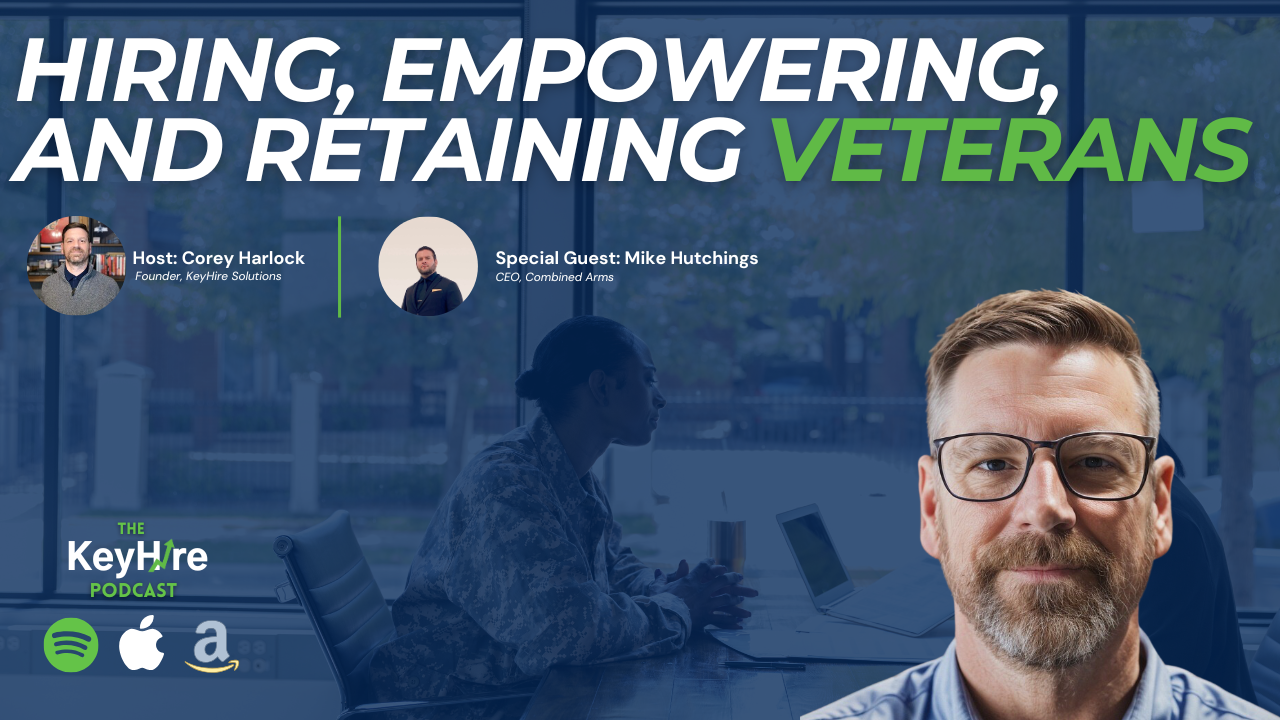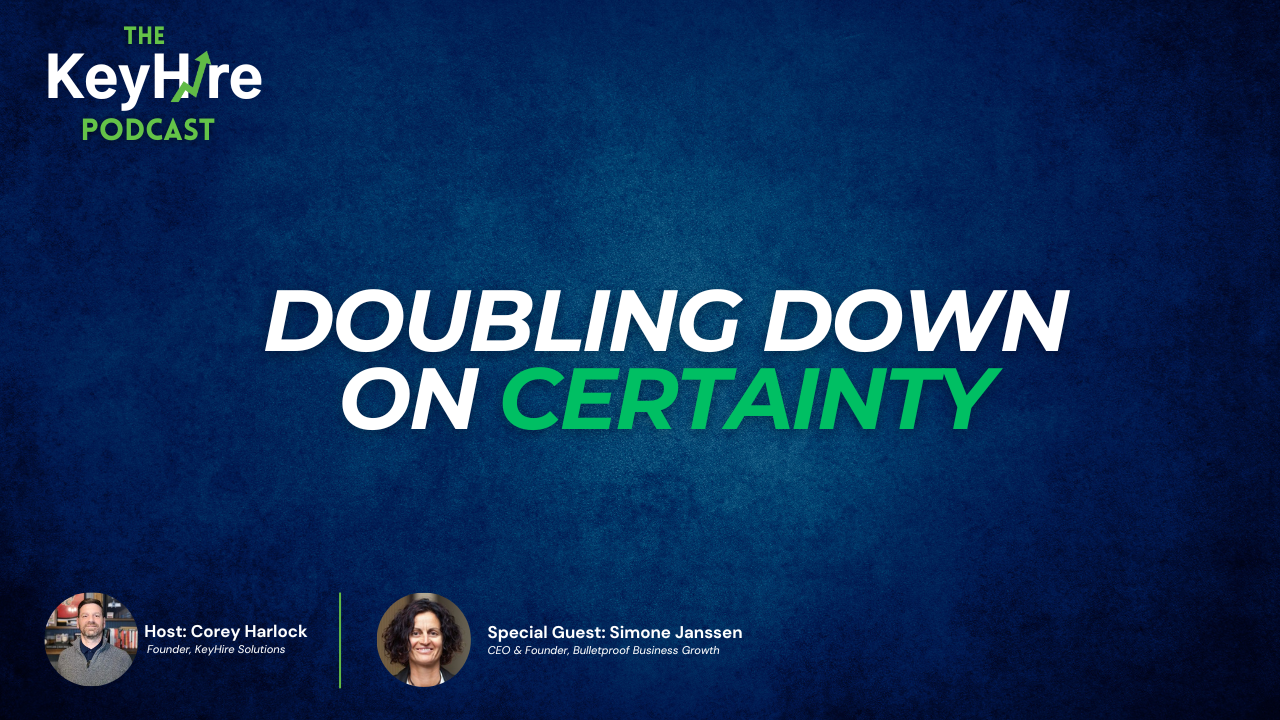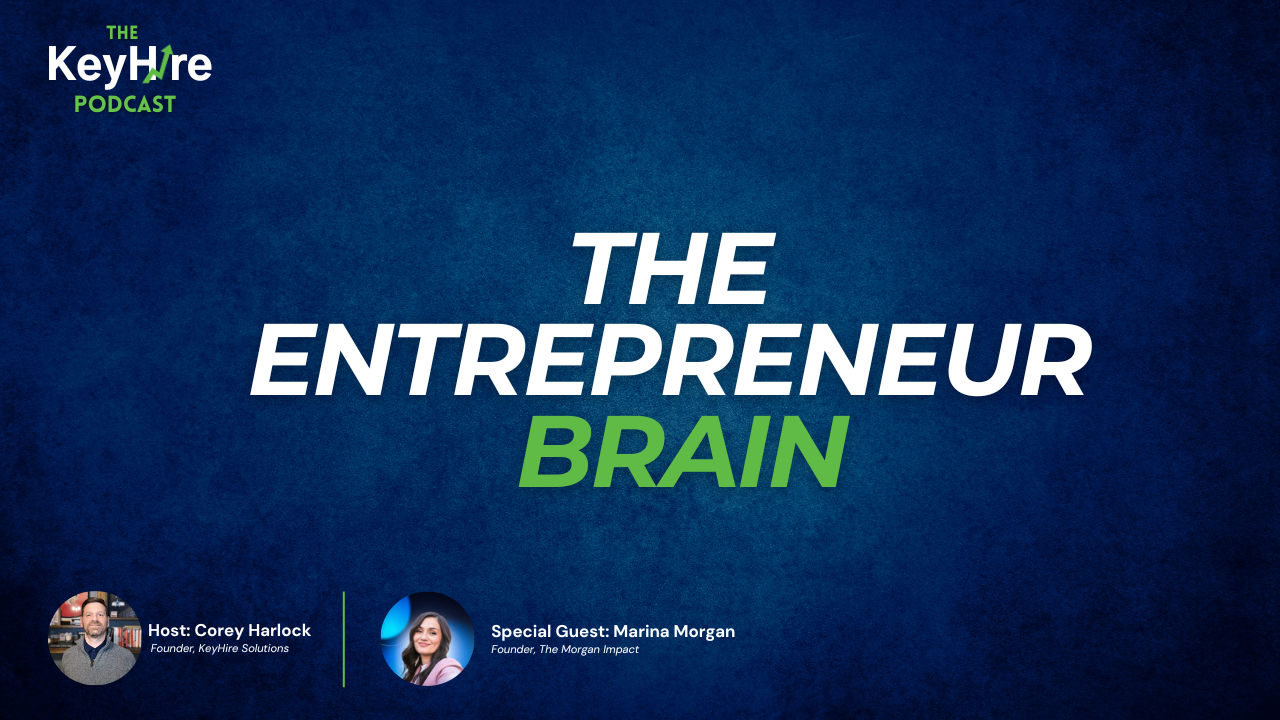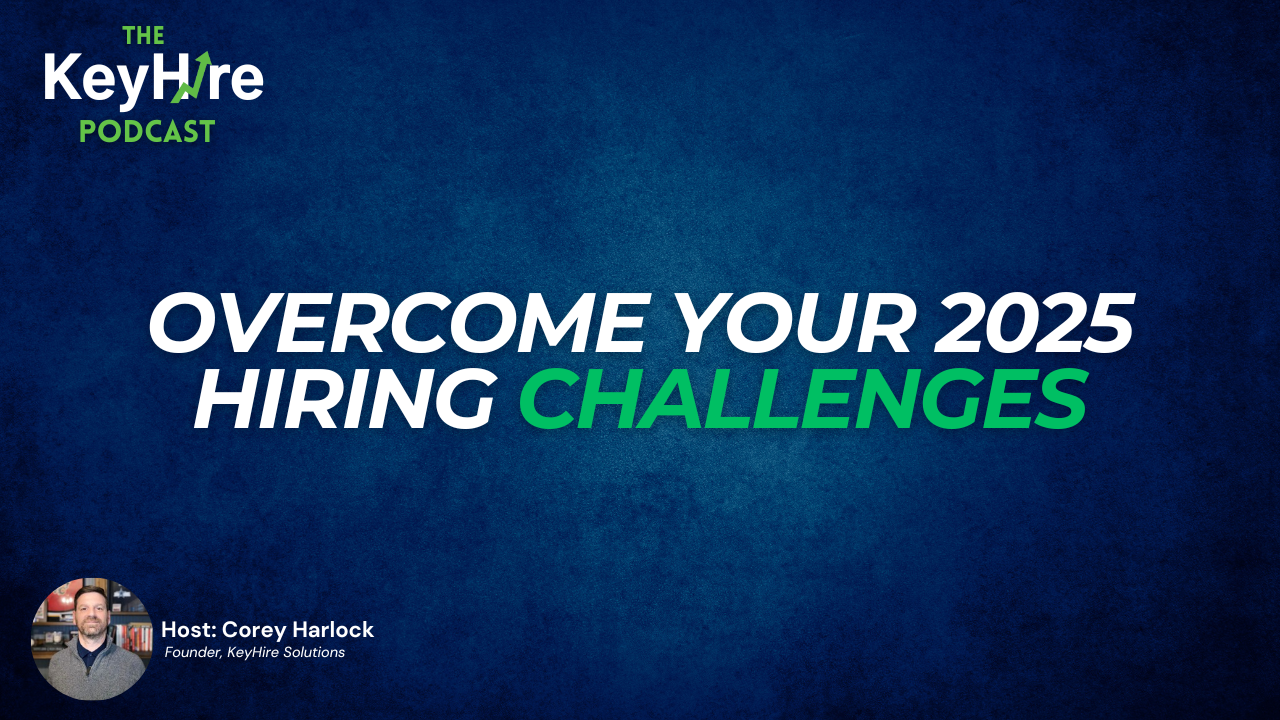Unlocking Hidden Talent: How Veterans Can Solve Your Hiring Challenges While Growing a Small Business

As a small business owner looking to strengthen your team, you always seek talented individuals who can drive results and adapt to your company's evolving needs. What if there were a proven talent pool right in your community? One filled with individuals who've already demonstrated their ability to perform under pressure, solve complex problems, and lead teams through challenging situations?
That talent pool exists, and it's comprised of the 250,000 military veterans who transition to civilian careers every year. In a recent KeyHire Small Business Podcast episode, host Corey Harlock sat down with Mike Hutchings, CEO of Combined Arms, to explore how small business owners can successfully integrate veteran talent into their organizations.
Understanding the Veteran Talent Landscape for Entrepreneurs
The veteran talent pool represents one of the most compelling opportunities in today's hiring market. With less than 1% of the American population currently serving in the military and approximately 250,000 veterans transitioning to civilian careers annually, this represents a substantial source of proven talent entering the workforce with leadership experience and specialized skills that many businesses need.
What makes this opportunity particularly valuable is the depth of experience veterans bring. Military service develops skills that directly translate to business success: leadership under pressure, strategic thinking, team coordination, and the ability to execute complex operations with precision. Veterans have managed budgets, led diverse teams, and solved problems in high-stakes environments that few civilian roles can replicate.
The key to successfully tapping into this talent pool is understanding how military experience translates to business value. Rather than getting caught up in military terminology or rank structures, focus on the underlying competencies: project management, crisis response, training and development, logistics coordination, and strategic planning.
Veterans also bring a unique perspective on accountability and results-driven performance. Their experience with clear objectives, measurable outcomes, and team-based success creates employees who understand individual responsibility and collective achievement.
The Hidden Goldmine: What Veterans Bring to Small Business Management
When you look beyond the uniform and military terminology, veterans offer a unique combination of skills that directly address common small business management challenges:
Problem-Solving Under Pressure: Veterans, particularly those with combat experience, have navigated what Mike calls "VUCA" environments – volatile, uncertain, complex, and ambiguous situations. "I have yet to see replicated anywhere outside of my time in the service," the level of innovation required when "something didn't go according to plan and we had to find ways to instantly adjust, sometimes under direct fire conditions."
Natural Entrepreneurial Mindset: Contrary to the stereotype of rigid military thinking, many veterans have extensive experience operating independently. Mike explains that in theater, "you very much become an entrepreneurial force of nature and operate almost as a complete entity... you have this large overarching task and you have to figure out a way to accomplish it."
Leadership at Every Level: Military structure ensures that even junior personnel take on significant leadership responsibilities. Veterans understand accountability, team dynamics, and how to motivate others to achieve objectives.
Adaptability and Learning Agility: Military careers require constant adaptation to new roles, locations, and challenges. This translates into employees who can grow and take on evolving responsibilities with your business.
Practical Small Business Hiring Strategies for Veteran Talent Acquisition
Successfully hiring veterans requires a strategic approach that addresses the unique challenges and opportunities this talent pool presents. Here are actionable strategies based on Mike's insights:
1. Connect with Your Local Veteran Community
The most effective approach isn't posting jobs on generic boards -- it's building relationships within the veteran ecosystem. Building these connections means attending local veteran organization events such as VFW and American Legion chapters, connecting with veteran-focused nonprofits in your area, and signing up for your state Department of Veterans Services mailing list.
2. Ask the Right Questions During Interviews
Don't hesitate to ask about military experience -- veterans want to discuss their service. Mike notes, "I have yet to come across a veteran who doesn't want to talk about their time in service and is not open to answering questions about their time in service."
During interviews, focus on specific responsibilities and leadership roles they held, problem-solving examples, decision-making under pressure, team management and conflict resolution experiences, and how they adapted to new environments and challenges. These conversations will help you understand what they did and how their military experience translates to your business needs.
3. Maintain Professional Standards
While supporting veterans, don't lower your hiring standards. "Not all transitioning service members are going to be great employees at your company just because they served," Mike warns. You should still ask the hard questions. You should still ensure that that individual has researched the company and understands certain things."
Setting Realistic Business Management Expectations
Once you've hired a veteran, success depends on setting appropriate expectations for integration. Transitioning from military to civilian work involves more than just changing jobs – it's a complete lifestyle adjustment.
The Integration Timeline: Instead of establishing rigid timelines for veteran integration, focus on creating a flexible, mentorship-based approach. A dedicated mentor working alongside the veteran during their first few months adds value for both the business and the veteran by facilitating smoother transitions and quicker immersion. Implement regular check-ins at 30 and 60 days to assess progress, target specific performance metrics, and maintain open conversations about expectations and adjustments.
Understanding Different Military Backgrounds Not all military experience is the same. Veterans who serve in combat environments may have different skill sets than those who remain stateside. Combat veterans often excel in unstructured, problem-solving environments, while others may thrive in more structured roles. Understanding these differences helps you place veterans in positions where they'll succeed.
The Importance of Open Communication "Open and honest conversations and malleability are what would be mutually respected from both sides," Mike emphasizes. Rather than assuming you know what a veteran needs, create space for ongoing dialogue about challenges and adjustments.
Avoiding Common Hiring Mistakes
Based on Mike's experience working with both veterans and employers, here are the key mistakes to avoid:
Veteran-Side Mistakes:
- Not doing enough homework on available transition resources
- Failing to translate military experience into civilian terms
- Over-emphasizing military identity instead of relevant business skills
Employer-Side Mistakes:
- Giving veterans a "pass" in the interview process due to their service
- Assuming all veterans have the same background and skills
- Being either too rigid or too accommodating without finding the right balance
Taking Action: Your Next Steps
If you're ready to tap into veteran talent for your business, start with these immediate actions:
- Research local veteran organizations and attend one networking event within the next 30 days
- Review your job descriptions to ensure they're veteran-friendly and clearly explain role requirements
- Develop a mentorship program or identify team members who can support veteran integration
The talent shortage affecting small businesses isn't going away, but the solution might be closer than you think. By effectively connecting with, interviewing, and integrating veteran talent, you can solve persistent hiring challenges while building a stronger, more resilient team.
Your business can play a crucial role in that transition while gaining access to some of the most capable and dedicated professionals in the workforce.
Key Takeaways:
- Veterans represent an untapped talent pool with proven leadership and problem-solving skills, perfect for growing businesses
- Successful veteran hiring requires community engagement and understanding of military-to-civilian translation challenges
- Proper integration involves mentorship, open communication, and realistic expectations rather than rigid timelines or special treatment
Want to listen to the full conversation? Listen to this episode of The Key Hire Small Business Podcast featuring Mike Hutchings.
Learn more about Mike: https://www.combinedarms.us and https://www.linkedin.com/in/mbhutch/
Check out our sponsor:
Career Spring, Careers launch here: https://careerspring.org/
Connect With Us:
KeyHire Solutions, Be Our Next Success Story: https://www.keyhire.solutions/testimonials
Contact Corey: corey@keyhire.solutions











